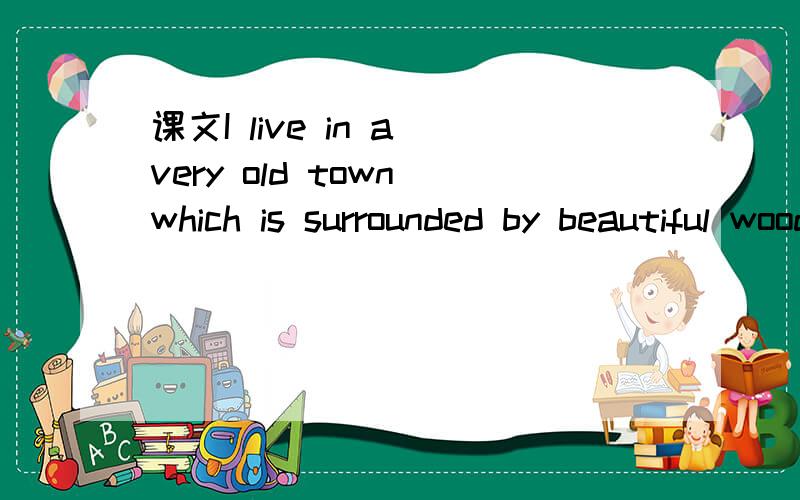课文I live in a very old town which is surrounded by beautiful woods.surround为什么要用过去式?现在这个小镇不也是被树林环绕吗?课文On Sundays,hundreds of people come from the city to see our town and to walk through the woods
来源:学生作业帮助网 编辑:作业帮 时间:2024/12/02 08:33:16

课文I live in a very old town which is surrounded by beautiful woods.surround为什么要用过去式?现在这个小镇不也是被树林环绕吗?课文On Sundays,hundreds of people come from the city to see our town and to walk through the woods
课文I live in a very old town which is surrounded by beautiful woods.
surround为什么要用过去式?现在这个小镇不也是被树林环绕吗?
课文On Sundays,hundreds of people come from the city to see our town and to walk through the woods.用every sundays可以吗?
课文but people still throw their rubbish everywhere.为什么不用litter?
课文What I saw made me very sad.saw made两个动词连用中间为什么不加to?
课文Among the rubbish,I found a sign which said,
我写的i found a sign which said in the rubbish可以吗?主要是among 和 in!
课文I live in a very old town which is surrounded by beautiful woods.surround为什么要用过去式?现在这个小镇不也是被树林环绕吗?课文On Sundays,hundreds of people come from the city to see our town and to walk through the woods
1、be surrounded by 是被包围的意思,这里不是过去式的表示,是说小镇被树木包围着,表被动.
2、这里的on sundays是泛指星期天的意思,是统称.假如你用了every了,就不能接复数,every sunday可以,表示每个星期天.
3、其实这里用rubbish与litter都可以,不过litter也可以做动词用.
4、这里的主语是what i saw(这里是指看到的东西),谓语动词是made,所以不需要接to,如果加了to就是累赘.
5、among the rubbish这里的意思是,在这堆垃圾里面(暗指签名是里面其中一个),而假如你写成“in the rubbish",则是对这垃圾做了个独立的统称,这样与原话的意思有出入的,因为把你的话翻译过来就是:我发现了一个签名,这签名是写在垃圾上的.这样的话,和原话“我在垃圾堆中发现一个签名写着……”是不一样的.
1.is surrounded 表示被动语态,是固定模式。
2.on sundays 泛指一到星期三,语法上来讲应该是every sunday。
3.一般情况下都用rubbish来指垃圾,litter不能算错,但一般不这样用。
4.此处what i saw是主语,made是谓语,me是宾语,后面的very sad是补足语。
是比较简单的主谓宾句型,所以不能加to。<...
全部展开
1.is surrounded 表示被动语态,是固定模式。
2.on sundays 泛指一到星期三,语法上来讲应该是every sunday。
3.一般情况下都用rubbish来指垃圾,litter不能算错,但一般不这样用。
4.此处what i saw是主语,made是谓语,me是宾语,后面的very sad是补足语。
是比较简单的主谓宾句型,所以不能加to。
5.你这句话没有写完,如果我没有记错的话,后面应该还有一部分。可以改为:i found a sign which said...(加上原句中的内容) in the rubbish。这样句子也是对的。
希望可以帮到你。
收起